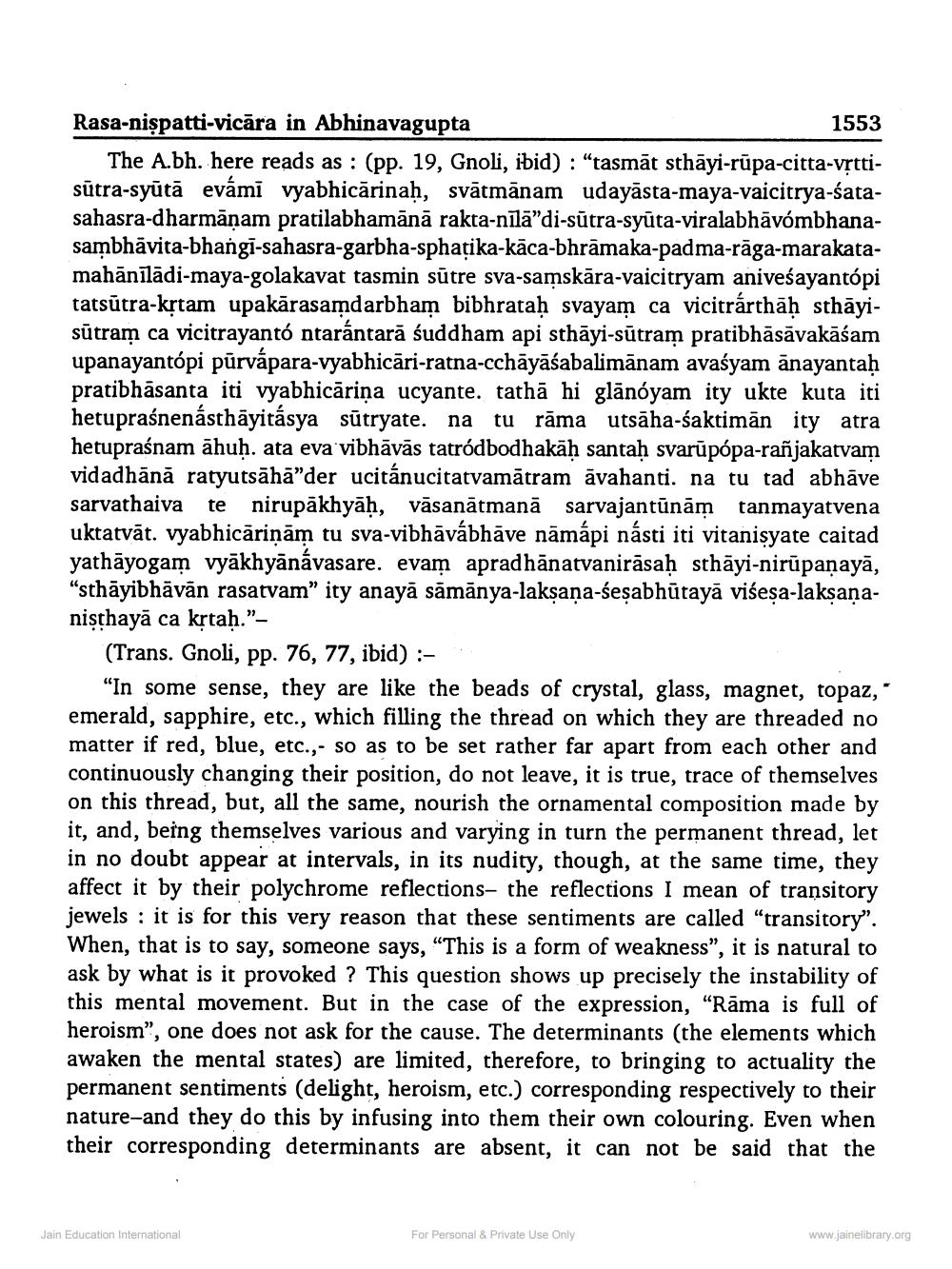________________
Rasa-nispatti-vicāra in Abhinavagupta
1553
The A.bh. here reads as : (pp. 19, Gnoli, ibid) : "tasmāt sthāyi-rūpa-citta-vrttisutra-syūtā evāmi vyabhicarinah, svātmānam udayāsta-maya-vaicitrya-satasahasra-dharmāņam pratilabhamānā rakta-nīlā”di-sūtra-syūta-viralabhāvómbhanasambhāvita-bhangi-sahasra-garbha-sphatika-kāca-bhrāmaka-padma-rāga-marakatamahānīlādi-maya-golakavat tasmin sūtre sva-samskāra-vaicitryam aniveśayantópi tatsūtra-kstam upakārasamdarbham bibhrataḥ svayam ca vicitrárthāḥ sthāyisūtram ca vicitrayantó ntarántarā śuddham api sthāyi-sūtram pratibhāsāvakāśam upanayantópi pūrvápara-vyabhicāri-ratna-cchāyāśabalimānam avaśyam ānayantah pratibhāsanta iti vyabhicāriņa ucyante. tathā hi glānóyam ity ukte kuta iti hetupraśnenásthāyitásya sūtryate. na tu rāma utsāha-śaktimān ity atra hetupraśnam āhuh. ata eva vibhāvās tatródbodhakāh santah svarūpópa-rañjaka vidadhānă ratyutsāhā"der ucitánucitatvamātram āvahanti. na tu tad abhāve sarvathaiva te nirupākhyāḥ, vāsanātmanā sarvajantūnām tanmayatvena uktatvāt. vyabhicāriņām tu sva-vibhāvábhāve nāmápi násti iti vitanisyate caitad yathāyogam vyākhyānávasare. evam apradhānatvanirāsaḥ sthāyi-nirūpanayā, "sthāyibhāvān rasatvam” ity anayā sāmānya-lakṣaṇa-seṣabhūtayā višeșa-laksananisthayā ca krtah."
(Trans. Gnoli, pp. 76, 77, ibid) :
"In some sense, they are like the beads of crystal, glass, magnet, topaz, emerald, sapphire, etc., which filling the thread on which they are threaded no matter if red, blue, etc.,- so as to be set rather far apart from each other and continuously changing their position, do not leave, it is true, trace of themselves on this thread, but, all the same, nourish the ornamental composition made by it, and, being themselves various and varying in turn the permanent thread, let
o doubt appear at intervals, in its nudity, though, at the same time, they affect it by their polychrome reflections, the reflections I mean of transitory jewels : it is for this very reason that these sentiments are called “transitory”. When, that is to say, someone says, “This is a form of weakness", it is natural to ask by what is it provoked ? This question shows up precisely the instability of this mental movement. But in the case of the expression, "Rāma is full of heroism", one does not ask for the cause. The determinants (the elements which awaken the mental states) are limited, therefore, to bringing to actuality the permanent sentiments (delight, heroism, etc.) corresponding respectively to their nature and they do this by infusing into them their own colouring. Even when their corresponding determinants are absent, it can not be said that the
Jain Education International
For Personal & Private Use Only
www.jainelibrary.org




